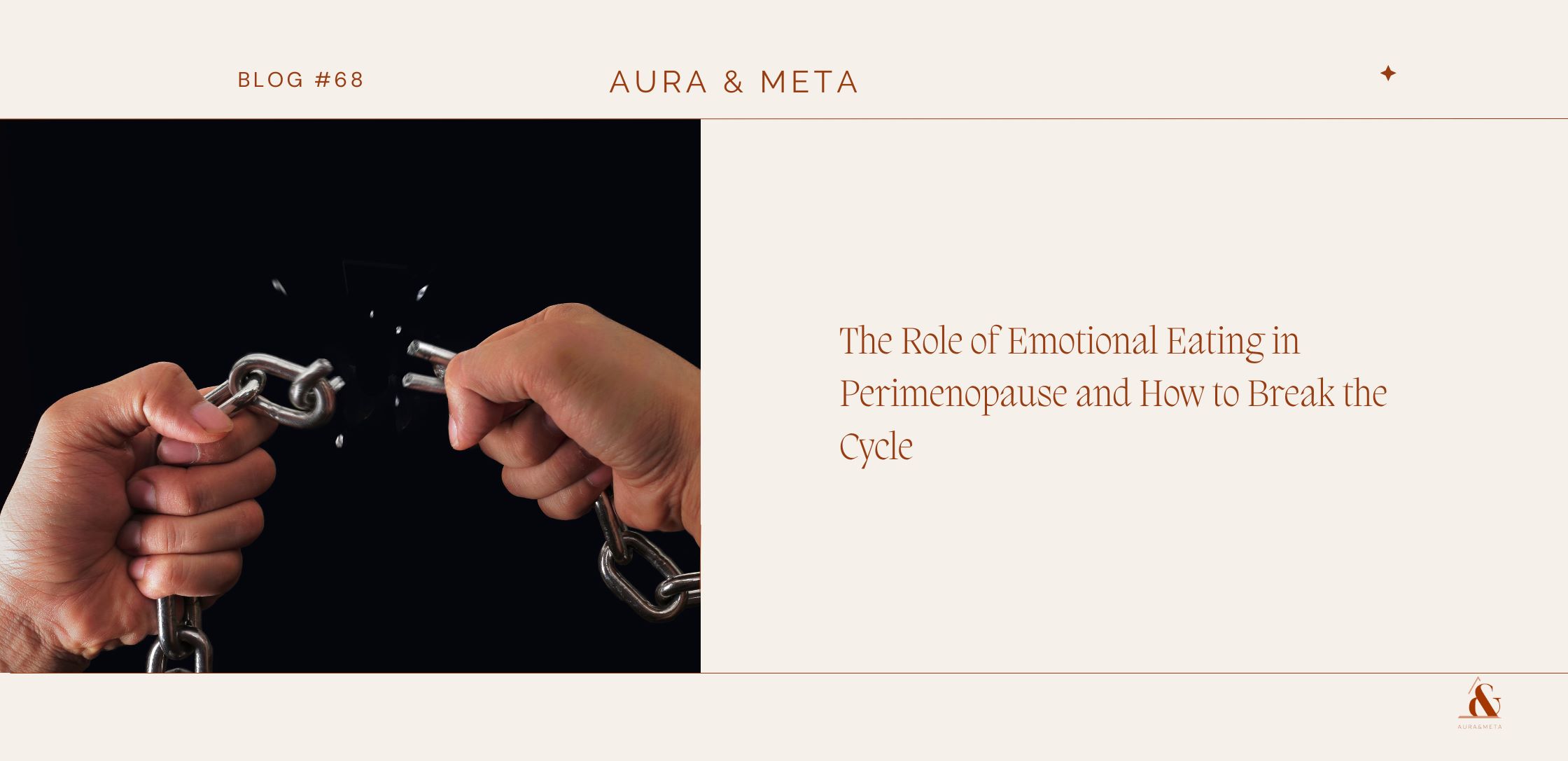Perimenopause, the transitional phase leading up to menopause, can bring significant hormonal changes that affect both physical and emotional health. Emotional eating often becomes a coping mechanism during this time as women navigate mood swings, stress, and the uncertainty that hormonal shifts can bring. In this blog, we’ll explore the causes of emotional eating during perimenopause, the cycle it creates, and how women can break free to achieve balance and well-being.
At Aura & Meta, we understand how challenging this phase can be and are committed to providing personalized support for every step of the journey.
What Could Cause Emotional Eating During Perimenopause?
Hormones play a crucial role in regulating mood, appetite, and energy. As oestrogen and progesterone levels fluctuate during perimenopause, these changes can impact neurotransmitters like serotonin, which helps regulate mood. When serotonin levels dip, many women experience increased cravings, particularly for sugary or high-carb foods that can temporarily boost serotonin but may lead to an emotional eating cycle.
Moreover, chronic stress during perimenopause can increase cortisol production. Elevated cortisol levels can intensify cravings and lead to overeating as a way to cope with stress, ultimately contributing to weight gain. To better understand your body’s hormonal changes, Women’s Hormone Testing can provide valuable insights and guide personalized support.
Recognizing the Emotional Eating Cycle
Emotional eating often follows a cycle:
- Triggering Emotion: Stress, loneliness, or anxiety triggers a desire to eat for comfort.
- Craving Certain Foods: Often, high-sugar or high-fat foods are craved because they provide a temporary mood lift.
- Eating for Comfort: Eating becomes a way to soothe or distract from the underlying emotion.
- Temporary Relief and Guilt: After eating, there may be a short-lived sense of relief, followed by guilt, shame, or disappointment.
- Cycle Repeats: The cycle then repeats with each new emotional trigger, creating an ingrained habit that can be challenging to break.
Breaking the emotional eating cycle requires addressing both the physical and emotional triggers, as well as finding healthier ways to cope. Through nutritional therapy and personalized strategies, we help women understand and manage these triggers effectively.
Breaking Free: Tools and Techniques to Address Emotional Eating
1. Mindful Eating
Mindful eating involves paying attention to the act of eating, being present with each bite, and tuning into hunger and fullness cues. When practiced regularly, mindful eating helps you distinguish between physical hunger and emotional triggers, enabling better choices. Try setting aside time for meals without distractions and focus on savouring each bite.
2. Balancing Blood Sugar Levels
Stable blood sugar levels can reduce cravings and help maintain mood balance. Eating meals rich in protein, fibre, and healthy fats can keep blood sugar stable, reducing the likelihood of reaching for sugary snacks. Foods like lean protein, whole grains, and green vegetables support steady energy and help reduce cravings. At Aura & Meta, we prioritize personalized nutrition plans tailored to each client’s unique needs.
3. Emotional Awareness and Coping Mechanisms
Identifying the emotions that drive emotional eating is essential for breaking the cycle. Journaling or keeping an emotion log can help recognize patterns and provide insights into triggers. Finding alternative ways to address these emotions—such as through relaxation techniques, connecting with friends, or practicing self-care—can also support resilience. We offer guidance on effective emotional and mental health practices, including the benefits of kinesiology for emotional balance and well-being.
4. Neuroenergetic Kinesiology for Emotional Balance
Neuroenergetic kinesiology is a valuable tool for identifying energy blockages related to emotional eating. By detecting and addressing these blockages, women can work through underlying issues contributing to emotional eating. This approach can be particularly supportive during perimenopause when emotions often run high due to hormonal shifts. Our team at Aura & Meta specializes in helping women find and release these blockages to support emotional and physical well-being.
5. Hormone Testing and Balancing
Understanding hormonal fluctuations is key to managing emotional eating. Hormone testing, like the DUTCH test, provides insights into oestrogen, cortisol, and other hormone levels that impact mood and cravings. By understanding hormone levels, we can implement targeted support to balance them naturally, reducing emotional eating triggers and supporting energy stability.
6. Creating a Support System
Creating a support network can make a significant difference in breaking the emotional eating cycle. Sharing experiences with others, seeking professional guidance, or simply having an accountability partner can provide the support needed to maintain changes. Aura & Meta’s services are designed to empower clients through a supportive environment that fosters sustainable lifestyle changes.
Building a Healthier Relationship with Food
Establishing a balanced and positive relationship with food during perimenopause is possible with the right strategies and support. Instead of viewing food as a source of comfort or a reward, it’s important to recognize it as fuel for the body. Practicing gratitude for nourishing foods and focusing on their benefits can shift the mindset away from using food to cope with emotions.
Reclaim Your Health with Aura & Meta
Emotional eating during perimenopause can feel overwhelming, but with the right approach, breaking the cycle is achievable. By understanding the root causes of emotional eating, addressing hormonal imbalances, and building healthier coping mechanisms, women can reclaim their health and well-being.
At Aura & Meta, we offer personalized support to guide you through this transitional phase, empowering you to overcome emotional eating and embrace a balanced, nourishing relationship with food. Book a call with us to explore how we can support your journey toward emotional and physical wellness.

